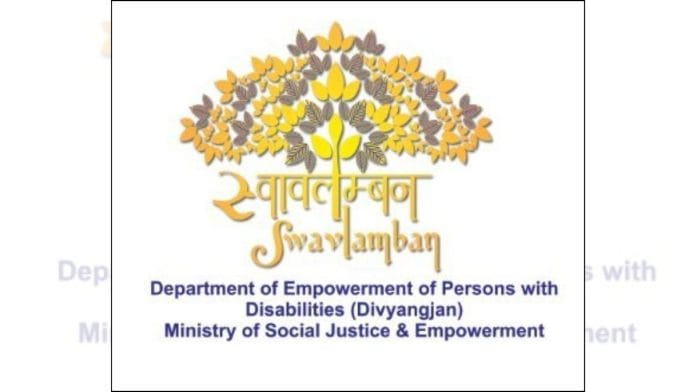New Delhi: The inclusion of first India-made Intelligence Quotient (IQ) test for assessment of intellectual disabilities, allowing private doctors to be part of the medical board that certifies disability — these changes have been introduced in the revised guidelines for the assessment of disabilities, ThePrint has learnt. The norms also include key provisions related to specific learning impairment.
This has been done with the aim of simplifying the certification process.
The revised guidelines, which were notified by the Department of Empowerment of Persons with Disabilities (DEPwD) under the Union Ministry of Social Justice and Empowerment Friday, will help expedite the disability certification process, senior ministry officials said.
The disability certification is essential for differently-abled people to get a Unique Disability Identification (UDID), which since last year has been made mandatory for availing benefits of various government schemes.
Due to lack of clarity in norms in the previous guidelines, which were issued in 2018, and shortage of government doctors in some specialties, a large number of disabled people were finding it difficult to get the certificates, according to rights activists.
In the revised guidelines, the Centre has included a new IQ test, which has been developed by the National Institute for the Empowerment of Persons with Intellectual Disabilities (NEIPID) in Secunderabad, to assess intellectual disability.
Currently, doctors in India use western tests such as Wechsler Intelligence Scale for Children (WISC) or Wechsler Adult Intelligence Scale (WAIS-4) to assess intellectual disability, according to a senior official.
“The western tests in use right now are not very relevant in the Indian context to assess intellectual disability. We have now included the new IQ test developed by NEIPID in the guidelines along with the western tests. The NEIPID’s IQ test has been developed after a detailed study and survey in the past few years,” Rajesh Aggarwal, secretary DEPwD, told ThePrint.
“We are providing training to doctors on how to use this test. Another major change in the guidelines is related to specific learning disability. In the new norms, we have provided the assessment tools for people with Specific Learning Disability (SLD) who are above 18 years of age, which was not there in the previous norms,” added Aggarwal.
Also read: Govt advisory on ICU doctors without speciality in critical care medicine sparks row
According to officials, several changes have been made in intellectual disability, blood-related disorders etc which were added to the list of disabilities in the Rights of Persons with Disabilities (RPwD) Act of 2016, which replaced the Persons with Disabilities Act 1995.
The 2016 Act recognises 21 disabilities — including 14 such as intellectual disability, sickle cell disease, thalassemia, and autism — which were not there in the Persons with Disabilities Act, 1995.
Another major change in the guidelines is related to the setting up of a medical authority. Over the years, one of the major reasons for the huge pendency in disability assessment has been shortage of specialists in government hospitals.
As per the previous norms, only government doctors were allowed to be part of the medical authority for issuing certificates. But now, medical specialists can be roped from private hospitals to assess disability.
“In view of shortage of the specialist doctors resulting in huge pendency in disability assessment, the chairperson (who compulsorily has to be a government doctor e.g. a chief medical officer or civil surgeon or as specified) of the disability assessment board may, if required, include private medical practitioner(s) (duly qualified in the respective medical domain) as a board member,” the notification read.
Aggarwal said this will expedite the process to issue certificates to people with disabilities.
The DEPwD along with the Ministry of Health and Family Welfare has been working on the new guideline since last year after issues were raised by disability rights activists and medical experts.
A senior ministry official said, “There were 6-7 expert committees constituted last year to look into the guidelines for locomotive disability, specific learning disabilities, blood disorders such as thalassemia, sickle cell anaemia etc (that were added in the list of disabilities in 2016). We held extensive consultation with doctors, including from rural areas, who are involved in the process of issuing disability certificates before finalising it,” said a senior ministry official.
Welcoming the decision, T.D. Dhariyal, former Delhi state commissioner for Persons with Disabilities, said, “There were several inconsistencies in the guidelines, especially related to the percentage of impairment. Impact of pain on the functioning of a person was not properly assessed. Now, the guidelines are clear about how various disabilities should be assessed.”
Awareness programme soon
The department of empowerment of persons with disabilities is planning to soon start online sessions to inform doctors about the new guidelines.
Senior officials said that the new guidelines will speed up the process of issuing disability certificates and people will then be able to get UDIDs.
Though the Centre started issuing UDIDs after the RPwD Act, 2016, came into force from 2017, a little over one crore UDIDs have been issued so far. In a written response to a question in the Lok Sabha, Minister of State for Social Justice and Empowerment Pratima Bhoumik said as on January 31, 2024, “1,06,97,568 UDID cards have been generated”.
Disability rights activists say that the UDID numbers are less given the total population of persons with disabilities in India. One of the main hurdles in getting UDID has been the delay in getting a disability certificate from the government medical authority, Dhariyal said.
Aggarwal said, “From next week, we will start special drives to tell doctors about the new disability guidelines. This will further hasten the process.”
(Edited by Tikli Basu)
Also read: Karnataka’s draft bill for gig workers: income security, occupational safety, grievance redressal






